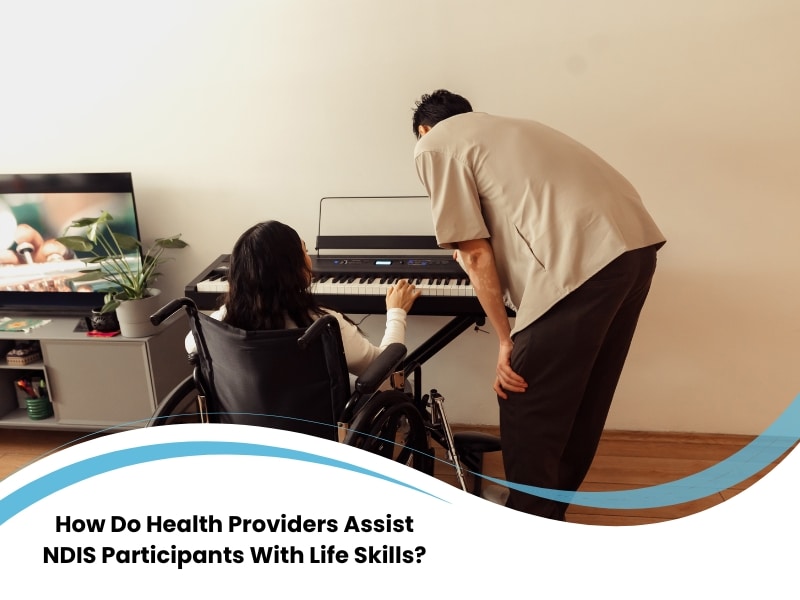Life skills are crucial to living independently, but many NDIS participants struggle to build or retain them. With the right health provider, individuals can access structured support to assist NDIS participants in gaining these essential abilities. It’s not just about funding—it’s about applying it with intention, strategy, and care.
Why do NDIS participants often struggle with life skills?
Living with disability brings challenges that can affect how easily someone develops practical and social skills. These life skills—like managing time, preparing food, maintaining hygiene, or even joining a conversation—aren’t always taught directly. Many participants face:
- Learning or cognitive delays
- Unstable or inconsistent carer schedules
- Lack of tailored development programs
- Isolation or limited community exposure
In some cases, skills regress over time. This is especially true when participants are passed between support workers without a clear developmental plan. While families try to step in, they often lack the training or time to provide structured support.
Without dedicated support for life skills through NDIS, many participants experience frustration, lower confidence, and increased reliance on others. Their capacity to live independently is compromised, not because they lack ability, but because the structure isn’t there to nurture it.
What happens when functional support isn’t prioritised?
Overlooked support can widen the gap between a participant’s needs and their reality. When functional support is not central to the care plan, participants may:
- Miss appointments or forget tasks
- Rely too heavily on carers for basic needs
- Avoid social interaction or public spaces
- Struggle with time, money, or self-care routines
These issues often lead to greater isolation and anxiety. In some cases, participants begin to disengage from their own goals. Instead of moving toward independence, they plateau—or worse, regress.
A more proactive model includes NDIS care from home, allowing participants to develop and practise skills in familiar environments. For example, learning to cook becomes easier when done in their own kitchen, not in a group setting. It’s less confronting and more relevant.
Programs focused on long-term growth rather than short-term fixes have improved emotional stability, fostered community participation, and reduced the strain on informal carers.
How can gaps in health strategy affect daily progress?
Even with appropriate funding, the absence of a cohesive health strategy can block progress. A common issue lies in poor communication across providers. For instance, a participant might have occupational therapy goals that are not reinforced by their support workers due to a disconnection between services. Gaps like these often appear when:
- Many providers fail to tailor plans to each participant’s needs
- Allied health professionals and carers don’t communicate
- Emotional and behavioural goals are not integrated
- Many plans overlook emotional and behavioural goals
The result? Confusion, repeated mistakes, and reduced outcomes. Disconnected services often leave participants juggling mixed messages without a clear routine.
A health provider aiming to assist NDIS participants through a strategy-led model coordinates across all services to ensure consistent care. This includes aligning therapy goals with daily support routines and equipping carers with the tools to deliver effective skills coaching.
Table: Common Gaps vs. Strategic Support
Gap in Service | Strategic Health Provider Response |
Generic care tasks | Custom, individualised life skills programs |
Support worker turnover | Scheduled consistency in staffing |
Lack of emotional support | Allied health inclusion in planning |
Progress not measured | Milestone-based reviews and updates |
How do health providers tailor life skill programs under NDIS?
Tailored support is one of the most effective solutions for building independence. A quality provider begins with a thorough assessment and follows with adaptable strategies based on the participant’s environment and abilities. A customised program will often include:
- Initial evaluation by occupational therapists
- Structured coaching sessions tied to real-life scenarios
- Routine building with visual aids or digital tools
- Participation from carers for continuity of support
These programs are reviewed and refined regularly, based on milestones or changing needs. For example, a participant learning to budget might start by tracking expenses and then progress to planning a grocery list with a set amount. Feedback loops with caregivers and allied health ensure each new skill sticks.
For participants with layered needs, such as behavioural challenges alongside physical disabilities, programs often include integrated supports from allied health, therapy, and behavioural coaching. Providers experienced in how NDIS providers help with complex needs are more likely to deliver consistent, outcome-driven care that adapts over time.
When providers offer this level of customisation, participants are more likely to engage. They see success in small wins, like preparing their own lunch or catching a bus. These practical gains build momentum and self-belief.
How does NDIS support independent living for participants?
NDIS plans are designed to build capacity, not dependency. However, to reach that goal, support must be action-oriented. Independent living is about managing the demands of daily life in a way that’s safe, sustainable, and suited to the individual. Supports can include:
- Personal care routines like grooming and dressing
- Shopping and meal planning
- Navigating public transport
- Money handling and simple banking
The role of the provider is to turn these abstract goals into daily practice. That could mean role-playing a bus trip, helping someone build a hygiene checklist, or providing coaching during meal prep.
Whether the person lives with family or in supported accommodation, providers must work toward gradual independence. By embedding skills into everyday contexts, participants build confidence over time.
Developing daily routines like cooking, budgeting, or managing transport doesn’t happen overnight. Health providers play a pivotal role in building participant independence in NDIS, using real-world tasks to steadily increase confidence and self-sufficiency.
How can participants choose the right NDIS health provider?
Selecting a health provider to assist NDIS participants isn’t just about offering services—it’s about fit, flexibility, and long-term thinking. A good provider aligns with the participant’s values and communicates clearly from the start. Here’s a checklist to guide the selection process:
- Do they provide customisable, flexible programs?
- Are allied health services integrated?
- Is the support team consistent and trained in disability services?
- Are goals tracked and reviewed regularly?
Look for transparency. The provider should be able to explain how progress is tracked, how strategies are revised, and how they involve the participant in decision-making.
It’s also worth evaluating how providers respond to feedback. Support plans must evolve as participants grow. The most effective providers invite collaboration, not just between professionals but also with participants and carers.
For those exploring options or reassessing their support network, it’s worth learning more about Abundance Healthcare Group. Understanding how different providers structure life skills support can help participants and families make informed choices that align with long-term goals.





